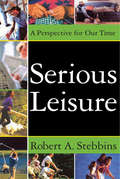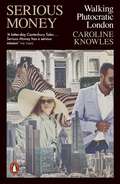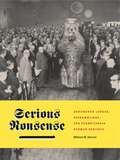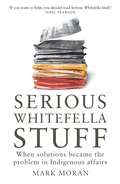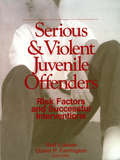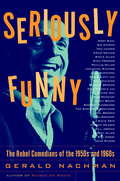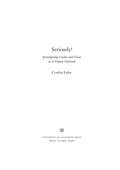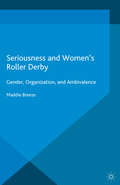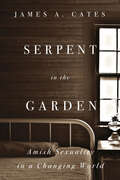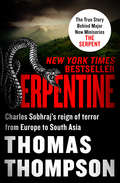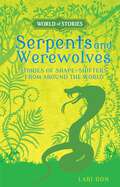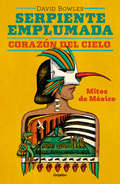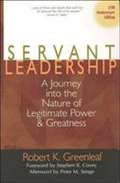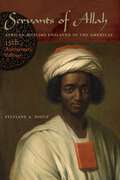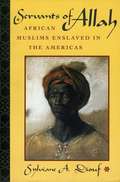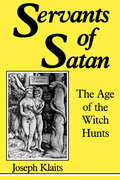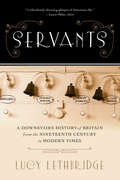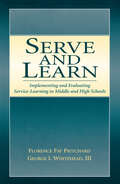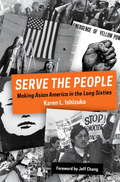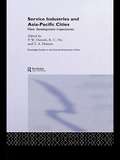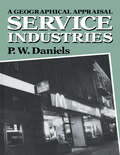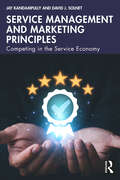- Table View
- List View
Serious Leisure and Nature
by Robert A. Stebbins Lee DavidsonOutings in nature considered as leisure activity constitute a main way in which many people the world over presently use their free time. Nature is defined here as any natural setting perceived by users as at most only minimally modified by human beings. In its most general manifestation nature thus defined is composed of one or more of six elements: air, land, water, plants, animals (birds, fish) and snow or ice. Outdoor pursuits are immensely popular, especially among city dwellers. They are also widely discussed in leisure studies, where they have inspired considerable research. Still this research tends to lack a theoretic anchor, which this book provides through the new serious leisure concept of nature challenge activity (NCA). It examines several hundred NCAs and types of NCAs, setting out how meeting this challenge unfolds in an aesthetically appealing natural environment with notable implications for consumption and environmental sustainability.
Serious Leisure: A Perspective for Our Time (Leisure Studies In A Global Era Ser.)
by David.B SachsmanSerious Leisure offers a comprehensive view and analysis of the current state of the sociology of leisure. Defining and differentiating the way people use their free time, Robert A. Stebbins divides such activity into categories of serious (skilled), casual (unskilled), and project-based (short-term) leisure that he further separates into a variety of types and subtypes. Together they comprise what he calls the serious leisure perspective. Stebbins sets out the basic concepts that make up the three leisure forms, focusing on their essential elements.Stebbins sees serious leisure realized by way of a set of foundational concepts—organization, community, history, lifestyle, and culture. He reviews the history and background of the concept of serious leisure and follows up with historical commentary. Finally, he examines the future and the importance of the serious leisure perspective in a globalizing world, and some of its critical links with other fields of knowledge and practice, notably the nonprofit sector and preventive medicine.Serious Leisure is a coherent and comprehensive resource setting out the main parameters of what is now widely recognized as an interdisciplinary research area. It will be of interest to sociologists, labor studies specialists, and economists.
Serious Money: Walking Plutocratic London
by Caroline Knowles'A latter-day Canterbury Tales ... Serious Money has a serious mission' The Times'Eye-opening ... part guide, part indictment of a yawning wealth gap' Misha Glenny, Financial TimesLondon is a plutocrat's paradise, with more resident billionaires than New York, Hong Kong or Moscow. Far from trickling down, their wealth is burning up the environment and swallowing up the city. But what do we really know about London's super rich, and the lives they lead?To find out more about this secretive elite, sociologist Caroline Knowles walks the streets of London from the City to suburban Surrey. Her walks reveal how the wealthy shape the capital in their image, creating a new world of gated communities and luxury developments. Along the way we meet a wide and wickedly entertaining cast of millionaires, billionaires and those who serve them: bankers, tech tycoons, Conservative party donors, butlers, bodyguards, divorce lawyers and many more.By turns jaw-dropping, enraging and enlightening, Serious Money explodes the fiction that wealth is a condition to aspire to, revealing the isolation and paranoia which accompany it when the plutocrat's recompense - a life of unlimited luxury - ultimately proves hollow. It is a powerful reminder that it is not just the super-rich who get to make the city: we make it too, and could demand something different. Because serious money is good for no one - not even the rich.'An eye-opening, deeply disturbing, fast-moving journey through the lives, homes and affairs of the filthy rich of London' Danny Dorling, author of All That Is Solid'A wonderful and vital account of a city ruled by, and for, extreme wealth' Anna Minton, author of Big Capital
Serious Nonsense: Groundhog Lodges, Versammlinge, and Pennsylvania German Heritage (Keystone Books)
by William W. DonnerVersammlinge—community events filled with songs, performances, speeches, and skits that celebrate Pennsylvania German heritage and culture—are held entirely in the Pennsylvania German Deitsch language. Some, the “groundhog lodges,” feature a ceremony honoring the groundhog, while others do not. These unique meetings, expressions of a distinctive ethnic identity in the context of a rapidly changing society, have become a traditional mainstay among Pennsylvania Germans who have worked to preserve their language and culture into the twenty-first century. Serious Nonsense introduces readers to Pennsylvania German cultural practices that tourists rarely see and that outsiders, including most scholars, rarely learn about. The book explores the origins of the versammlinge and details the practice’s significance since the 1930s, when the first meetings of the Pennsylvania German groundhog lodges were held. Much as they did then, versammlinge today follow a pattern of prayers, patriotism, and speeches extolling values associated with Pennsylvania German identity, as well as theatrical and oral events that humorously contrast a simpler past with a more complex and confusing present. And the groundhog lodges feature one Pennsylvania German tradition that has become familiar in popular culture: groundhog weather prognostication.
Serious Nonsense: Groundhog Lodges, Versammlinge, and Pennsylvania German Heritage (Keystone Books)
by William W. DonnerVersammlinge—community events filled with songs, performances, speeches, and skits that celebrate Pennsylvania German heritage and culture—are held entirely in the Pennsylvania German Deitsch language. Some, the “groundhog lodges,” feature a ceremony honoring the groundhog, while others do not. These unique meetings, expressions of a distinctive ethnic identity in the context of a rapidly changing society, have become a traditional mainstay among Pennsylvania Germans who have worked to preserve their language and culture into the twenty-first century. Serious Nonsense introduces readers to Pennsylvania German cultural practices that tourists rarely see and that outsiders, including most scholars, rarely learn about. The book explores the origins of the versammlinge and details the practice’s significance since the 1930s, when the first meetings of the Pennsylvania German groundhog lodges were held. Much as they did then, versammlinge today follow a pattern of prayers, patriotism, and speeches extolling values associated with Pennsylvania German identity, as well as theatrical and oral events that humorously contrast a simpler past with a more complex and confusing present. And the groundhog lodges feature one Pennsylvania German tradition that has become familiar in popular culture: groundhog weather prognostication.
Serious Whitefella Stuff: When solutions became the problem in Indigenous affairs
by Mark MoranHow does Indigenous policy signed off in Canberra work-or not-when implemented in remote Aboriginal communities? Mark Moran, Alyson Wright and Paul Memmott have extensive on-the-ground experience in this area of ongoing challenge. What, they ask, is the right balance between respecting local traditions and making significant improvement in the areas of alcohol consumption, home ownership and revitalising cultural practices?Moran, Wright and Memmott have spent years dealing with these pressing issues. Serious Whitefella Stuff tells their side of this complex Australian story.
Serious and Violent Juvenile Offenders: Risk Factors and Successful Interventions
by Dr Rolf Loeber Professor David P. FarringtonDetailed and comprehensive, this volume presents authoritative discussions by leading scholars on issues surrounding serious and violent juvenile offenders. This population is responsible for a disproportionate percentage of all crime and poses the greatest challenge to juvenile justice policymakers. This volume integrates knowledge about risk and protective prevention programs, so that conclusions from each area can inform the other.
Seriously Funny: The Rebel Comedians of the 1950s and 1960s
by Gerald NachmanThe comedians of the 1950s and 1960s were a totally different breed of relevant, revolutionary performer from any that came before or after, comics whose humor did much more than pry guffaws out of audiences. Gerald Nachman presents the stories of the groundbreaking comedy stars of those years, each one a cultural harbinger: * Mort Sahl, of a new political cynicism * Lenny Bruce, of the sexual, drug, and language revolution * Dick Gregory, of racial unrest * Bill Cosby and Godfrey Cambridge, of racial harmony * Phyllis Diller, of housewifely complaint * Mike Nichols & Elaine May and Woody Allen, of self-analytical angst and a rearrangement of male-female relations * Stan Freberg and Bob Newhart, of encroaching, pervasive pop media manipulation and, in the case of Bob Elliott & Ray Goulding, of the banalities of broadcasting * Mel Brooks, of the Yiddishization of American comedy * Sid Caesar, of a new awareness of the satirical possibilities of television * Joan Rivers, of the obsessive craving for celebrity gossip and of a latent bitchy sensibility * Tom Lehrer, of the inane, hypocritical, mawkishly sentimental nature of hallowed American folkways and, in the case of the Smothers Brothers, of overly revered folk songs and folklore * Steve Allen, of the late-night talk show as a force in American comedy * David Frye and Vaughn Meader, of the merger of showbiz and politics and, along with Will Jordan, of stretching the boundaries of mimicry * Shelley Berman, of a generation of obsessively self-confessional humor * Jonathan Winters and Jean Shepherd, of the daring new free-form improvisational comedy and of a sardonically updated view of Midwestern archetypes * Ernie Kovacs, of surreal visual effects and the unbounded vistas of video Taken together, they made up the faculty of a new school of vigorous, socially aware satire, a vibrant group of voices that reigned from approximately 1953 to 1965. Nachman shines a flashlight into the corners of these comedians' chaotic and often troubled lives, illuminating their genius as well as their demons, damaged souls, and desperate drive. His exhaustive research and intimate interviews reveal characters that are intriguing and all too human, full of rich stories, confessions, regrets, and traumas. Seriously Funny is at once a dazzling cultural history and a joyous celebration of an extraordinary era in American comedy.
Seriously!
by Cynthia EnloeIn Seriously!, Cynthia Enloe, author of the groundbreaking analysis of globalization, Bananas, Beaches, and Bases, addresses two deeply gendered and contested questions: Who is taken seriously? And who gets to bestow the label "serious" on others? With a strategy of taking both women and gender dynamics seriously, Cynthia Enloe investigates the Dominique Strauss-Kahn affair and the banking crash of 2008, the subsequent recession, as well as UN peacekeeping and the ongoing Egyptian revolution. Each case study highlights the gritty experiences of women in diverse circumstances--in banks, on the job market, in war zones, and in revolutions. The results of taking women seriously are fresh insights into what fuels the cultures of hyper-risk taking, of sexual harassment, and the denial of women's post-war security.
Seriousness and Women's Roller Derby: Gender, Organization, and Ambivalence (Leisure Studies in a Global Era)
by Maddie BreezeThis book explores seriousness in practice in the unique sports context of contemporary women's flat track roller derby. The author presents a stimulating argument for a sociology of seriousness as a productive contribution to understandings of gender, organization and the mid-ranges of agency between dichotomies of voluntarism and determinism.
Serpent in the Garden: Amish Sexuality in a Changing World
by James A. CatesThe first book to examine the complexity of sexual identity, philosophy, and behavior in Amish culture.The Amish offer a startling contrast to the postmodern view of sexuality and gender roles. After the sexual revolution of the 1960s, mainstream American culture never looked back. Meanwhile, the Amish never looked forward. In twenty-first-century Amish communities, heteronormative sexuality is still based on a unifying principle: an understanding of sexuality as emerging from a divine plan. In the eyes of the Amish, sex is squandered by those who embrace it as hedonistic or who carve out a sexual identity that moves them away from that singular, God-given purpose. But this communal emphasis on sex for procreation does not mean that the Amish do not possess a complex range of sexual identities and opinions.In Serpent in the Garden, clinical psychologist James A. Cates breaks new ground in the study of Amish sexuality by examining this shrouded, rarely discussed subject. The first book to bring Amish sexuality into primary focus, this volume argues that, because the Amish are a sexual minority, queer theory is the ideal framework from which to observe their views on sex, sexuality, and gender. The book offers a broad view of sexuality in Amish culture that includes the challenges that gays and lesbians face in the community, as well as an exploration of Amish gender roles, their views toward intimacy, their responses to cases of child sexual abuse, and the role of fetishes among the Amish. Cates draws from multiple perspectives and years of research on the Amish themselves. He also looks at pushback against alternative behaviors or identities, as well as Amish success in keeping mainstream values at bay. With this book, Cates establishes Amish sexuality as a topic worthy of professional attention. Offering readers a more sophisticated understanding of the Amish and of sexual expression among cultures, Serpent in the Garden will appeal to scholars working on gender and sexuality, the Amish, and social service professionals who serve the Amish community.
Serpentine: Charles Sobhraj's Reign of Terror from Europe to South Asia
by Thomas ThompsonNew York Times Bestseller: This in-depth account of Charles Sobhraj, the serial killer portrayed in Netflix miniseries The Serpent, is &“compulsive reading&” (The Plain Dealer). There was no pattern to the murders, no common thread other than the fact that the victims were all vacationers, robbed of their possessions and slain in seemingly random crimes. Authorities across three continents and a dozen nations had no idea they were all looking for same man: Charles Sobhraj, aka &“The Serpent.&” A handsome Frenchman of Vietnamese and Indian origin, Sobhraj targeted backpackers on the &“hippie trail&” between Europe and South Asia. A master of deception, he used his powerful intellect and considerable sex appeal to lure naïve travelers into a life of crime. When they threatened to turn on him, Sobhraj murdered his acolytes in cold blood. Between late 1975 and early 1976, a dozen corpses were found everywhere from the boulevards of Paris to the slopes of the Himalayas to the back alleys of Bangkok and Hong Kong. Some police experts believe the true number of Sobhraj&’s victims may be more than twice that amount. Serpentine is the &“grotesque, baffling, and hypnotic&” true story of one of the most bizarre killing sprees in modern history (San Francisco Chronicle). Edgar Award–winning author Thomas Thompson&’s mesmerizing portrait of a notorious sociopath and his helpless prey &“unravels like fiction, but afterwards haunts the reader like the document it is&” (The Plain Dealer, Cleveland).
Serpents and Werewolves: Stories of Shape-Shifters from around the World (World of Stories)
by Lari DonA princess makes a daring deal with the Queen of the Snakes. A lonely sister weaves stinging plants together in order to save her brothers from their mother. A curious boy suddenly becomes a wolf cub. Discover a worldwide collection of shape-shifter stories, based on folktales and lore from the Americas, Asia, Africa, and Europe. From cursed princes to the first werewolves, things aren't always what they seem!
Serpiente emplumada, corazón del cielo: Mitos de México
by David BowlesUna magnífica recreación literaria de los más grandes mitos mesoamericanos, que ofrece como una sola historia los fragmentos dispersos de una cosmogonía hoy perdida. Serpiente emplumada, corazón del cielo sigue la historia del mundo desde sus orígenes en los sueños del dios dual Ometeotl hasta la llegada de los conquistadores españoles a México y la caída de la gran ciudad de Tenochtitlan. A través de esta narración conocemos sobre los Gemelos Creadores, Quetzalcóatl y Tezcatlipoca, y cómo construyeron el mundo sobre el lomo de un lagarto gigante; sobre los nahuales que pueden cambiar de forma y los aluxes que protegen las selvas y los bosques; sobre Eréndira, la princesa purépecha que resistió los embates de los conquistadores extranjeros, y sobre otros personajes y sucesos clave de la mitología y la historiografía mesoamericanas. De este modo, David Bowles reconstruye en este libro un universo mitológico heterogéneo y fragmentario con el fin de ofrecer a los lectores un relato unificado que pueda ayudarnos a entender la manera en que los pueblos mesoamericanos concebían el mundo y a la humanidad dentro de él. Serpiente emplumada, corazón del cielo resulta así no sólo una obra de narrativa sublime, sino un excelente texto de referencia para todas aquellas personas interesadas en el legado cultural de estos pueblos. «Serpiente emplumada, corazón del cielo de Bowles será crucial para los estudios literarios y culturales mesoamericanos […] Académicos y lectores de mitología y folclore: agreguen esto a los clásicos -World Literature Today mitos mexicanos; mitologia; ometeotl; quetzalcoatl; tezcatlipoca; mitos mayas; mitos prehispanicos; mexico precolombino; cosmogonía; serpiente emplumada; corazon oscuro del cielo; quinto sol; juego de pelota ; popol vuh; huhnapu; ixbalanque; tecuciztecatl; nanahuatzin; tlaloc; xipe totec; ixchel; xochiquetzal; xolotl; dioses mexicas; cipactli; mictlan; origen del hombre; huitzilopochtli; toltecas; mayas; mexicas; nahuas; uxmal; erendira; sac nicte; chichen itza; fundacion de tenochtitlan; conquista de mexico; encuentro de dos mundos; leyenda de los volcanes; tlacaelel; malinalli; malinche; presagios funestos; moctezuma y cortes; donaji; panteon mexica; dioses mesoamericanos; leyendas mexicanas; seres mitologicos; seres fantasticos; [Críticas/Reseñas]
Servant Leadership: A Journey into the Nature of Legitimate Power and Greatness
by Robert K. GreenleafIt work on leadership for business men and women, government leaders and all persons in positions of authority.
Servants of Allah: African Muslims Enslaved in the Americas
by Sylviane A DioufAn illuminating study of how African Muslims drew on Islam while enslaved, and how their faith ultimately played a role in the African Disapora. It is widely assumed that the faith enslaved West African Muslims brought to the Americas was quickly absorbed into their new Christian milieu. Yet, as Sylviane A. Diouf demonstrates in this meticulously-researched, groundbreaking volume, Islam flourished during slavery on a large scale. Even while enslaved, many Muslims managed to follow most of the precepts of their religion. Often literate, urban, and well-traveled, they drew on their organization, solidarity and the strength of their beliefs to play a major part in the most well-known slave uprisings. But for all their accomplishments and contributions to the history and cultures of the African Diaspora, the Muslims have been largely ignored. Servants of Allah illuminates the role of Islam in the lives of both individual practitioners and communities, and shows that though the religion did not survive in the Americas in its orthodox form, its mark can be found in certain religions, traditions, and artistic creations of people of African descent. This fifteenth-anniversary edition has been updated to include new materials and analysis, a review of developments in the field, prospects for new research, and illustrations.
Servants of Allah: African Muslims Enslaved in the Americas
by Sylviane A. DioufExplores the stories of African Muslim slaves in the New World. The author argues that although Islam as brought by the Africans did not outlive the last slaves, "what they wrote on the sands of the plantations is a successful story of strength, resilience, courage, pride, and dignity. " She discusses Christian Europeans, African Muslims, the Atlantic slave trade, literacy, revolts, and the Muslim legacy. Annotation copyrighted by Book News, Inc. , Portland, OR
Servants of Satan: The Age of the Witch Hunts
by Joseph KlaitsHow the persecution of witches reflected the darker side of the central social, political, and cultural developments of the sixteenth and seventeenth centuries.This is the first book to consider the general course and significance of the European witch craze of the sixteenth and seventeenth centuries since H.R. Trevor-Roper’s classic and pioneering study appeared some fifteen years ago. Drawing upon the advances in historical and social-science scholarship of the past decade and a half, Joseph Klaits integrates the recent appreciations of witchcraft in regional studies, the history of popular culture, anthropology, sociology, and psychology to better illuminate the place of witch hunting in the context of social, political, economic and religious change.“In all, Klaits has done a good job. Avoiding the scandalous and sensational, he has maintained throughout, with sensitivity and economy, an awareness of the uniqueness of the theories and persecutions that have fascinated scholars now for two decades and are unlikely to lose their appeal in the foreseeable future.” —American Historical Review“This is a commendable synthesis whose time has come . . . fascinating.” —The Sixteenth Century Journal“Comprehensive and clearly written . . . An excellent book.” —Choice“Impeccable research and interpretation stand behind this scholarly but not stultifying account.” —Booklist“A good, solid, general treatment.” —Erik Midelfort, C. Julian Bishko Professor Emeritus of History and Religious Studies, University of Virginia“A well written, easy to read book, and the bibliography is a good source of secondary materials for further reading.” —Journal of American Folklore
Servants: A Downstairs History of Britain from the Nineteenth Century to Modern Times
by Lucy Lethbridge"A ridiculously diverting glimpse of downstairs life in Edwardian England. . . . Most gratifying."--Laura Miller, Salon From the immense staff running a lavish Edwardian estate and the lonely maid-of-all-work cooking in a cramped middle-class house to the poor child doing chores in a slightly less poor household, servants were essential to the British way of life. They were hired not only for their skills but also to demonstrate the social standing of their employers--even as they were required to tread softly and blend into the background. More than simply the laboring class serving the upper crust--as popular culture would have us believe--they were a diverse group that shaped and witnessed major changes in the modern home, family, and social order. Spanning over a hundred years, Lucy Lethbridge?in this "best type of history" (Literary Review)?brings to life through letters and diaries the voices of countless men and women who have been largely ignored by the historical record. She also interviews former and current servants for their recollections of this waning profession. At the fore are the experiences of young girls who slept in damp corners of basements, kitchen maids who were required to stir eggs until the yolks were perfectly centered, and cleaners who had to scrub floors on their hands and knees despite the wide availability of vacuum cleaners. We also meet a lord who solved his inability to open a window by throwing a brick through it and Winston Churchill's butler who did not think Churchill would know how to dress on his own. A compassionate and discerning exploration of the complex relationship between the server, the served, and the world they lived in, Servants opens a window onto British society from the Edwardian period to the present.
Serve and Learn: Implementing and Evaluating Service-learning in Middle and High Schools
by Florence Fay Pritchard George I. Whitehead, IIIThis volume makes two important contributions: First, it provides a framework grounded in theory and best professional practice that middle and high school teachers, their students, and community partners can use to design, implement, and evaluate service-learning projects that address authentic community needs. Second, it demonstrates ways collaborative service-learning can enhance students' intellectual development, promote their academic achievement, strengthen their citizenship skills, and accelerate the kinds of educational accountability and reform initiatives emphasized in the national educational standards movement, and the 2002 No Child Left Behind Act. Serve and Learn: Implementing and Evaluating Service-Learning in Middle and High Schools: *provides what may be the only comprehensive guide to implementing, assessing, and celebrating service-learning in today's middle and high schools; *emphasizes and explicates a collaborative approach to service-learning in which teachers, students, and community partners team together to advance learning and meet genuine community needs; *demonstrates how service-learning teams use key elements of standards-based education, multiple intelligences theory, and cooperative learning to guide project development, implementation, assessment, and evaluation; *offers optional designs for service-learning projects that are suitable for use by interns and beginning teachers, as well as by experienced and master teachers, and that can be used in a developmental sequence by school and community partners to build from small, individual projects toward school, system, and community wide projects; and *includes end-of-chapter activities that help those who use the book as a text to practice the model and its strategies, and use results to create their own service-learning projects. The book is organized in three parts that present service-learning along a theoretical to practical continuum. Part I lays the foundations for the method by proposing a collaborative model for service-learning. Part II explicates this model and explains the four sets of processes that teams use to commit to a project, cooperatively determine students' project outcomes and ways to measure them, develop learning activities to help students achieve outcomes, and then evaluate their projects and celebrate growth. Part III provides resources for carrying out the collaborative model. A wide range of educators will find this book useful. Its distinctive contributions and features are particularly valuable for teacher educators, students, and community partners already committed to service-learning projects; to those who are introducing service-learning into their practice; and to instructional supervisors, school administrators, and community agencies seeking to create a climate for service-learning or to enrich initiatives already underway.
Serve the People: Making Asian America in the Long Sixties
by Jeff Chang Karen IshizukaA narrative history of the movement that turned "Orientals" into Asian Americans Until the political ferment of the Long Sixties, there were no Asian Americans. There were only isolated communities of mostly Chinese, Japanese, and Filipinos lumped together as "Orientals." <P><P>Serve the People tells the story of the social and cultural movement that knit these disparate communities into a political identity, the history of how--and why--the double consciousness of Asian America came to be. At the same time, Karen Ishizuka's vivid narrative reveals the personal epiphanies and intimate stories of insurgent movers and shakers and ground-level activists alike. <P><P>Drawing on more than 120 interviews and illustrated with striking images from guerrilla movement publications, the book evokes the feeling of growing up alien in a society rendered in black and white, and recalls the intricate memories and meanings of the Asian American movement. Serve the People paints a panoramic landscape of a radical time, and is destined to become the definitive history of the making of Asian America.
Service Dogs (Dog Heroes)
by Linda TagliaferroThe tornado was coming, but Betty who is deaf couldn't hear it. Her dog Tykie, however, knew what was on the way. He touched Betty's leg and raced to the window. Betty followed. When she saw the funnel cloud, she grabbed Tykie and dashed into a closet. Seconds later, the tornado hit. It destroyed the front of Betty's house, but she and her dog were safe. Tykie had saved her life. Look inside to find out more about Tykie and the heroic deeds of other service dogs.
Service Industries and Asia Pacific Cities: New Development Trajectories (Routledge Studies in the Growth Economies of Asia)
by K. C. Ho P. W. Daniels T. A. HuttonDuring the second half of the twentieth century, development in the Asia-Pacific region has been dominated by industrialization. However, at the beginning of the twenty-first century, services, in particular, finance, information and creative services, have become deeply embedded in the processes of urban growth. In Asia-Pacific the rise of service industries has lead to national modernization programmes and globalization strategies. Services are also driving change in the internal form of city regions and are being actively deployed as instruments of metropolitan reconfiguration and land use changes. These changes have created problems such as social polarization and the displacement of traditional industries and residential districts. Also, there are tensions between local and global processes in the development of service industries, and between the imperatives of competitive advantage and sustainable development.Service Industries and Asia Pacific Cities brings together a multi-disciplinary team of experts to explore and illustrate the theoretical, conceptual and practical issues arising from the transformation of Asia-Pacific cities by service industries.
Service Industries: A Geographical Appraisal
by Peter W. DanielsFirst published in 1985. Routledge is an imprint of Taylor & Francis, an informa company.
Service Management and Marketing Principles: Competing in the Service Economy
by Jay Kandampully David J. SolnetThis book explores the service economy and challenges that all organizations face as goods and services make way for a world where customers (B2C) and businesses (B2B) seek seamless, thoughtful, and exceptional experiences. This book introduces readers to a range of interrelated topics and the application of service management and marketing theories which are fundamentally critical to the success of all enterprises seeking competitive advantage through enhanced customer experience.This book analyses management and marketing challenges in the service and experience economy and provides insights into how marketers and managers can strike a balance between supply, demand, price, and quality and leverage technology for operational efficiency and to better manage customer service and expectations. Through the coverage of critical foundational topics, from how value is created; the evolution of global economies from goods, services to experiences; foundations of customer-centric management; managing service workers; integrating human touch with high-tech service; and many others, the authors provide a holistic understanding of management in a complex, globally interconnected world. This book will be useful for students, researchers, and instructors of business management, marketing, commerce, and economics. It will also be of interest to professionals working in healthcare, retail, financial services, government hospitality, leisure, tourism, and other services.

